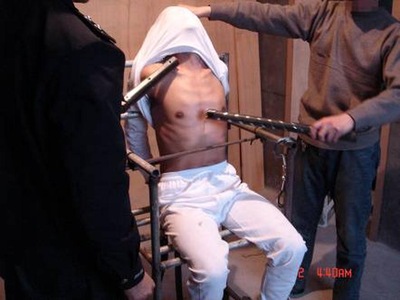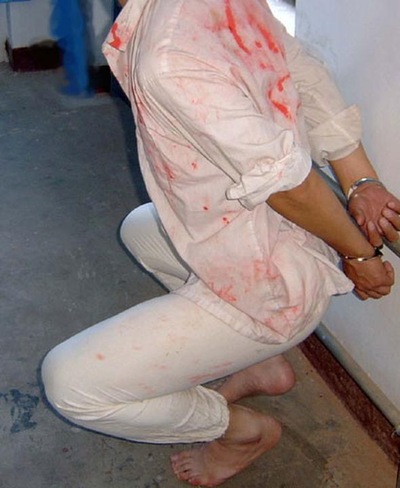(Minghui.org) When Liu Dexin walked out of prison after three years, what awaited him were police officers with handcuffs and his heartbroken parents and sister.
Mr. Liu's parents were in tears: as the first high school graduate in the region to go to a renowned university, their son had been an enormous source of pride for them. Now he was being was sent home in a police van in handcuffs. As the police arrived at his village in Shanxi Province, local police paid neighborhood residents to monitor Mr. Liu and prevent him from leaving his home.
One acquaintance of the family sighed in disappointment, “His [Mr. Liu's] family spent so much money raising him and sending him to college. What a pity for him to end up like this!”
For Mr. Liu, who currently lives in Shanghai, lack of freedom was not even the half of it. The beatings, electric baton shocks, and mental pressure he endured inside was beyond imagination.
On September 26, 2015, he submitted a criminal complaint against former Chinese leader Jiang Zemin for persecuting Falun Gong. Over 190,000 citizens have filed such legal documents to the Supreme Court and the Supreme Procuratorate in China since May.
Rising from the Ashes
Mr. Liu's family was poor. His parents worked hard their entire lives, but, like most other peasants in China, they hardly had any savings. To make things worse, Mr. Liu suffered from chronic illnesses for years and his bad temper was also a major headache for his parents.
The turning point came in July 1995, when Mr. Liu's doctor told him about Falun Gong, a meditation that improved mind and body. Mr. Liu read the books, learned the exercises, and began to follow the principles of Truthfulness-Compassion-Forbearance.
“That totally changed my life,” Mr. Liu recalled. His illnesses disappeared and his temper improved. His poor grades in school became history, and he turned into a straight-A student.
Surprised by his positive changes, many students and teachers asked him what happened. They soon learned about Falun Gong and some began to practice it.
Detained for His Faith
Jiang Zemin ordered the nationwide ban on Falun Gong in China in July 1999. Mr. Liu, a college student at that time, was detained for two weeks in the same month.
When he went to Beijing and submitted a letter of appeal on behalf of Falun Gong in late 1999, plainclothes officers confiscated his letter and arrested him. He was held in the Wanbailin Detention Center for two weeks and beaten every day.
When he was released, school officials attempted to expel him from the school. But Mr. Liu did not give up and reasoned with them. His parents also traveled from home to the school, begging officials to allow him to continue his studies.
Mr. Liu stayed, but school officials harassed him from time to time, demanding that he give up his belief in Falun Gong.
During the winter break in early 2000, he went to Beijing again to petition for the freedom to practice Falun Gong. the police arrested him and kept him at a detention center near Tiananmen Square along with practitioners from all over China. “Some were in their 90s, and some were less than 10 years old,” recalled Mr. Liu.
To avoid implicating their family members and local officials, many practitioners refused to tell their names or addresses. They were later secretly transferred to Miyun County near Beijing. “We could hear the screams of practitioners being tortured in the cells next to us,” said Mr. Liu.
Two officers beat and shocked Mr. Liu with electric batons until midnight. After he went on a hunger strike for six days, he was in critical condition and released.
The handcuffs were so tight that they left deep cuts in Mr. Liu's wrists. The scars are still visible today.
Torture Almost Took His Life
Mr. Liu graduated from college in the summer of 2001. However, just as he was leaving the campus, the police took him to the Hepingbeilu Police Station in Taiyuan, Shanxi Province.
“I was severely beaten and shocked with electric batons for 21 days straight there,” Mr. Liu said. As a result, he had bruises all over, with blood and fluid coming out of his head and injuries on his neck that left scars. His pants were torn to shreds and his legs exposed during the beatings.
Several officers at a time shocked him with electric batons all over his body but targeting sensitive areas such as his mouth, eyelids, and private parts.
 Torture reenactment: Shocked with electric batons.
Torture reenactment: Shocked with electric batons.
“The guards tried to get me to do two things. One was to write a statement renouncing Falun Gong, and the other was to help them trap and arrest another graduate from the college.” That student earned a scholarship every year based on academic excellence, but he was later expelled for practicing Falun Gong.
Because Mr. Liu refused to yield, the guards made things worse. One guard took him to a store that carried all kinds of torture devices and asked the owner, “Which one is the most brutal?” In the end, he chose the thickest electric baton with the highest voltage and pointed to Mr. Liu, saying, “I bought this for you and Falun Gong practitioners like you!”
In the cell, the guards tortured him with electric batons, including the heavy-duty one. “I became incontinent and lost consciousness,” recalled Liu. When the guards grew tired, they pushed Mr. Liu down on the floor and put a chair on him. One guard sat on the chair and continued shocking him. He ordered inmates to rub salt into Mr. Liu's wounds.
The guards handcuffed him to a metal pipe at night. He was unable to stand or squat down. The handcuffs tightened whenever he moved. “My hands and forearms were severely swollen,” said Mr. Liu.
 Torture reenactment: Handcuffed to pipes so that one is unable to stand or squat down.
Torture reenactment: Handcuffed to pipes so that one is unable to stand or squat down.
“I almost died at the detention center,” he wrote. “It is Jiang's persecution policy that turns police officers into demons that torture innocent people.”
Worst of the Worst
From the detention center, Mr. Liu was transferred to the Shanxi First Prison, a place for convicted felons.
“I was put in a smaller cell, with only a plastic bucket for a toilet, a bed, and a small stool.” Several inmates took turns monitoring him: no activities, no talking to others, just sitting on the small stool all day long.
“It went on like that, day after day. It could drive a person insane,” Mr. Liu said. “People usually think prison is the worst place, while inmates called that place 'the worst of the worst.'”
Two weeks later, the guards forced Mr. Liu to watch videos that defamed Falun Gong. Inmates then deprived him of sleep and tried to force him to give up his belief.
As time went on, the brainwashing intensified: he was forced to watch slanderous videos every day. Guards and inmates did everything they could think of to try to destroy his will.
“I have no idea how many times the guards beat me or tortured me—it was just too many.” And he was not alone. Other practitioners detained in the prison, from their teens to their 70s, experienced similar mistreatment.
“At least two practitioners were beaten to death in the prison: one was Liu Zhibin from Xinzhou; the other one was Kang Zhiguo. I do not know where he was from,” said Mr. Liu. “The persecution still continues, and Jiang needs to be held responsible for all of this.”
A similar tragedy happened to Liu Zhimei, a student from a poor family in Shandong Province who was admitted to the prestigious Tsinghua University in 1997. For practicing Falun Gong, she was arrested, detained, tortured, forced to undergo brainwashing, and raped. She became mentally disordered from the abuse and died in 2015 at the age of 35.




 Translation Updated: Fa Teaching at the 2015 West Coast Fa Conference Now Includes 1st Half of Questions and Answers”
Translation Updated: Fa Teaching at the 2015 West Coast Fa Conference Now Includes 1st Half of Questions and Answers”

